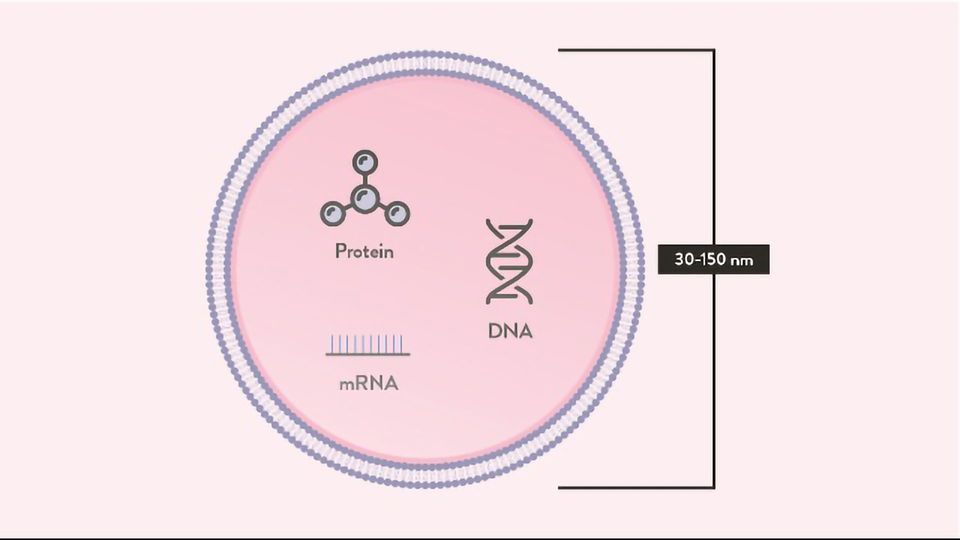The skincare world is constantly evolving, and exosomes are one of the most talked-about innovations today. These tiny cellular messengers—ranging from 30 to 150 nanometers in size—are generating significant interest in cosmetic dermatology. But what exactly are they, and do they live up to the hype?
Watch Dr. Radha’s Full Presentation on on Exosomes:
What Are Exosomes? Understanding Nature’s Cellular Delivery System
Exosomes are microscopic delivery packages that allow cells to communicate with one another. They transport a variety of biologically active materials, including proteins, lipids, nucleic acids, growth factors, and bioactive molecules. By transferring these components, exosomes help regulate skin repair, regeneration, and overall cellular function.
The Potential Skin Benefits of Exosomes
Emerging research suggests that exosomes may provide several dermatologic and cosmetic benefits.
1. Exosomes for Skin Rejuvenation
- Boost collagen and elastin production
- Reduce wrinkles and improve skin firmness
- Enhance hydration and radiance
2. Exosomes for Hair Growth
- Stimulate follicle cell activity
- Support hair restoration and scalp health
- Reduce scalp inflammation
3. Exosomes for Skin Barrier Support
- Improve moisture retention
- Strengthen the skin’s natural barrier
- Deliver beneficial molecules such as hyaluronic acid
Types of Exosomes Used in Skincare Treatments
Current scientific exploration focuses on three primary exosome sources.
1. Human-Derived Exosomes
- Highest biocompatibility with human skin
- Often derived from mesenchymal stem cells or platelets
- Show strong potential for anti-aging and skin rejuvenation
2. Plant-Derived Exosomes (PDENs)
- Naturally rich in antioxidants
- Fewer regulatory hurdles than human-derived options
- Require additional human clinical studies for validation
3. Animal-Derived Exosomes
- Includes platelet-rich plasma (PRP) derivatives
- Promising for tissue repair and wound healing
- Need further standardization and quality control
The Reality Check: Limitations and Research Gaps
Before investing in exosome-based skincare, it’s important to stay realistic about the science and regulations.
- No FDA Approval: No exosome treatments are currently FDA-approved for cosmetic use.
- Variable Quality: Results depend heavily on source material and isolation methods.
- Limited Research: More long-term, peer-reviewed studies are still needed.
- Lack of Standardization: Manufacturing and storage practices remain inconsistent.
What Types of Exosomes Show the Most Promise?
The most compelling data to date support the use of platelet-derived exosomes and human platelet extract. These have shown encouraging results in skin rejuvenation and wound healing applications.
How to Evaluate Exosome Based Skincare Products or Treatments
If you’re considering an exosome based treatment, pay close attention to the following factors.
1. Source Transparency
- Understand where the exosomes are sourced from
- Ask about isolation and purification processes
- Look for third-party testing or certificates of analysis
2. Clinical Evidence
- Review supporting published research
- Be cautious of exaggerated claims without data
- Look for peer-reviewed or clinical validation
3. Professional Guidance
- Always consult a board-certified dermatologist or qualified healthcare provider
- Discuss your skin goals and medical history
- Consider proven alternatives alongside emerging technologies
The Future of Exosomes in Cosmetic Dermatology
The field is advancing quickly, with researchers focusing on standardizing exosome isolation and storage, conducting large-scale clinical trials, developing clear regulatory guidelines, and understanding long-term biological effects.
The Bottom Line on Exosomes in Skincare
While exosomes represent an exciting new frontier in skincare science, it’s important to approach them with informed optimism. The technology holds significant potential, but the research is still evolving. As studies continue and regulations become clearer, exosome-based products may eventually find a secure place in cosmetic dermatology. For now, collaborate with trusted dermatologists who can provide evidence-based recommendations and realistic expectations.
This field evolves rapidly, and new findings appear regularly. You can always count on Skinsage doctors for accurate, up-to-date, and personalized advice about your skincare needs.



